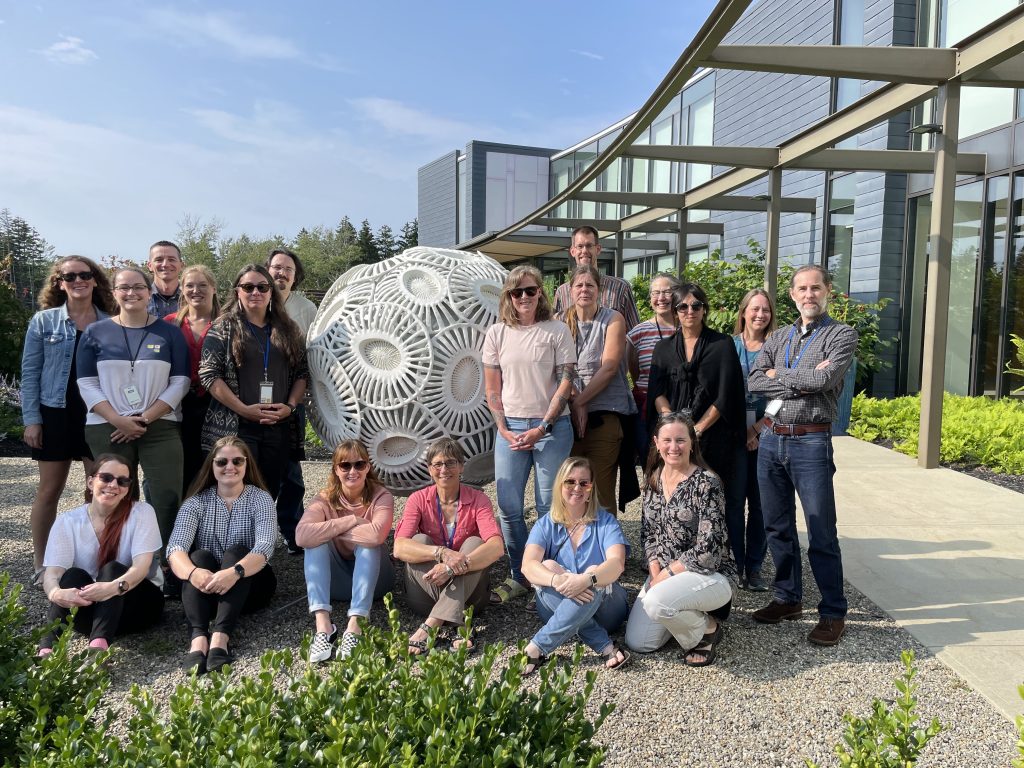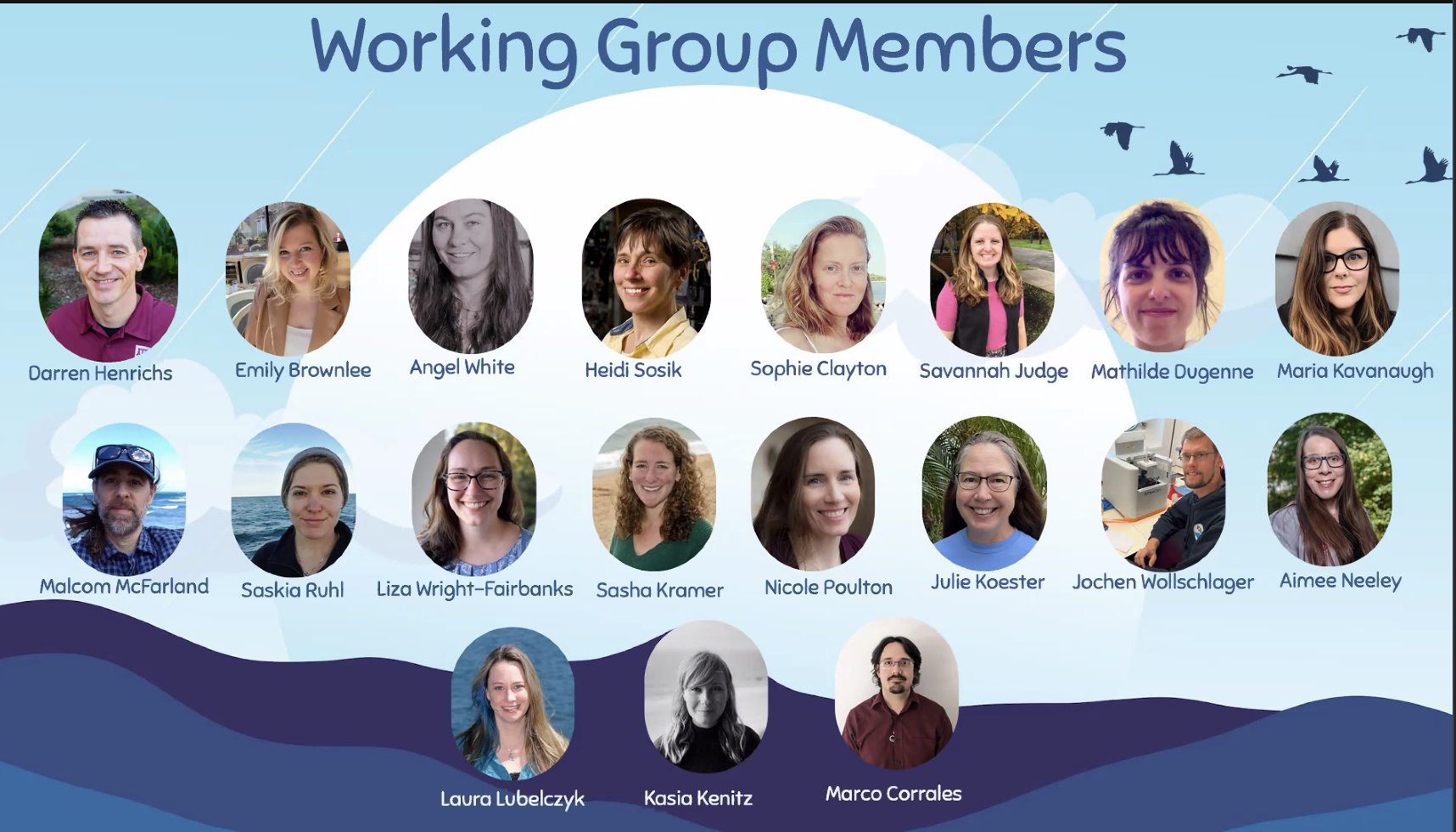Feb. 23, 2024: OPO WG to convene Town Hall Meeting at OSM2024 - get the details and RSVP here!

Operational Phytoplankton Observations Working Group update - Fall 2023
The first in-person meeting of the Operational Phytoplankton Observations (OPO) working group was held at the beautiful Bigelow Laboratory for Ocean Sciences in East Boothbay, Maine from August 2nd – August 4th, 2023. Participants were selected in May 2023 through an application process. The cohort of nineteen participants include both US and international partners, spanning from early to senior scientist career stages. The working group is focused on developing standard operating and sampling procedures for common particle imaging instruments (PIIs) used to quantify and identify phytoplankton in aquatic environments. Moreover, solutions for data interoperability between different sampling methods and PIIs were discussed and will be addressed in a subsequent best practices document that will be published to both Ocean Best Practices and a peer-reviewed journal. These best practices are intended to inform both current and potential users of PIIs and associated data across the oceanographic research community.
The agenda of this two and a half day meeting was designed to foster a collaborative, productive, and inclusive working environment. Participant-driven breakout sessions were guided by prepared discussion prompts to facilitate dialogue and exchange ideas. Through these collaborations, the participants defined the fundamental elements required for the collection and management of phytoplankton image data that may be applied generally to all PIIs in the form of a best practices document outline. Self-selected writing groups were assigned sections to facilitate the first draft of the best practices document.
Follow-on activities include two virtual, all-hands meetings scheduled in November and January 2024 to track the progress of the document and resolve any issues or questions from participants. Our final in-person meeting will be held the weekend prior to the Ocean Sciences Meeting in February 2024. Both internal and external reviews will be solicited in the spring of 2024 once a well-organized draft is complete. A sneak peak of the document will be presented at a town hall at the Ocean Sciences Meeting entitled ‘Building a Community of Practice for the Collection and Assessment of Operational Phytoplankton Observations.’ We will request feedback from the community during and after the town hall.
Working group to develop standards and best practices for the collection and assessment of Operational Phytoplankton Observations (OPO) using particle imaging instruments (PII).
Objective: The OPO Working Group members will create a set of best practices for different PIIs, water types, and sampling approaches. This activity is a follow-up to the Phytoplankton Taxonomy Working Group, which developed standards and practices for image data management and interoperability. The ultimate goal is to have these best practices endorsed by the Global Ocean Observing System (GOOS) and used in large scale ocean observing programs, such as repeat hydrographic programs and ocean observatories, long term ecological time series, as well as funded process study research cruises. The resulting standards and practices will be archived at Ocean Best Practices and in a Limnology and Oceanography Methods-type manuscript.
Justification: The number of particle imaging instruments (PII) for quantifying and identifying phytoplankton in aquatic environments has grown over the last decade, with several instruments now considered to be “mature technologies” with a Technological Readiness Level (TRL) between 7 and 9. Such methods are greatly advancing our capacity to measure Essential Ocean Variables (EOVs) and Essential Biodiversity Variables (EBVs) such as phytoplankton biomass, community composition, functional group, and size distribution, which have traditionally required labor-intensive collection and analysis methods. By enabling automated and high throughput quantification of phytoplankton cell biomass (cell counts, biovolume) and taxonomic diversity over both ocean space and time, PIIs are poised to revolutionize our understanding of planktonic ecosystems and will allow us to effectively monitor global changes over time.
Given that the number of PII currently being used in, or soon to be incorporated into, a variety of ocean observing networks and platforms has grown substantially, now is the time to establish best practices for using these instruments in a quantitative way that can be used to derive robust and sustained measurements of biological and ecological EOVs. Different PIIs have different limitations and commonly-used imaging flow cytometers differ in their data outputs as well as recommended sampling procedures. Each aquatic sampling technique and the volume of water measured will impact the quantitative rigor of the measurements.

The OPO Working Group will identify challenges associated with quantitative sampling of phytoplankton due to:
1) Different oceanic provinces and biomass levels (e.g., coastal, open ocean)
2) Aquatic sampling techniques (e.g., bottle, underway), profiling or towed technologies, ocean observatories (moorings)
3) Operational differences between current phytoplankton imaging instruments (PIIs) and analysis tools.
The OPO Working Group will develop recommendations for specific instruments and sampling techniques to ensure that phytoplankton measurements are consistent, robust, and quantitative. These guidelines will be published as a peer-reviewed paper for distribution to the broader community, and our goal will be to seek endorsement from the Global Ocean Observing System (GOOS) for the best practices recommendations that emerge from this activity. Additionally, the best practices recommendations will be archived as a document in the Ocean Best Practices System repository.
We will convene two in-person working group meetings August 2-4, 2023, and early 2024, along with asynchronous online activities in preparation for the in-person meetings. OPO Working Group members will also participate in regular synchronous virtual meetings occurring between the in-person meetings.